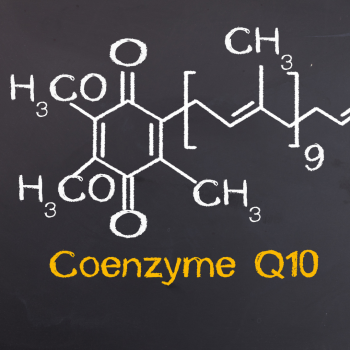

Hello everyone! Today I want to talk a little bit more about some specific antioxidants and a few products I feel are very important. Previously I spoke about the importance of antioxidants and detailed out top antioxidant products like Antioxidant Support and Mitochondrial Complex. So, why are CoQ10, NAC and Glutathione important antioxidants?
Coenzyme Q10 (CoQ10)
Coenzyme Q10 (CoQ10) is also known as ubiquinone. The active form is ubiquinol, which is better absorbed by the body. As we age, converting ubiquinone to ubiquinol becomes less efficient. Typically, for those over fifty-five, I recommend taking ubiquinol. It is a fat-soluble antioxidant, and it is depleted by various blood pressure and cholesterol-lowering medications. It is necessary for the mitochondrial production of adenosine triphosphate (ATP), our energy. It can also help with fatigue and is most popular for its help with cardiovascular diseases like heart failure and high blood pressure. It can prevent your cholesterol from oxidation. It also protects cells from death. I’ve found it helps reduce headaches in my patients. Severe deficiency can lead to cardiovascular complications like heart failure. Major food sources include meat, poultry, fish, beans, and eggs.
The recommended dosage is 30–300 mg/day. We carry a 100 and 300 mg dose.
Glutathione
Glutathione, as mentioned in my previous blog, is the most powerful antioxidant in the body, which protects you from free radical damage. It literally protects your DNA. It is helpful for DNA repair. It is made of three amino acids, cysteine, glutamic acid, and glycine. Glutathione is extremely important to the liver for helping with detoxification.
It helps you get rid of toxins like heavy metals. Taking Tylenol, smoking, and drinking alcohol will deplete your glutathione levels. Suzy Cohen, the author of Drug Muggers, says, “You pretty much use up all your glutathione just for eating, never mind dealing with drug muggers and lifestyle choices” (Cohen 2011, 143). Severe deficiency can lead to fatigue and autoimmune conditions and cancer. Major food sources include asparagus, avocado, garlic, green veggies, and beets.
The recommended dosage is 1,000–3,000 mg/day. We carry an oral version and SL liposomal version.
N-acetyl cysteine (NAC)
N-acetyl cysteine (NAC) is a modified form of the conditionally essential amino acid cysteine. Cysteine helps build hair, fingernails, and skin. It also helps destroy nasty chemicals from drinking and smoking, such as acetaldehyde, because it helps boost glutathione levels (which I just mentioned).
Tylenol is very hard on the liver. I recommend when my patients take it to also supplement with NAC, as NAC is also used to treat Tylenol poisoning. I also remember giving it to patients in the hospital in a medication called Mucomyst, which they inhaled. It smelled terribly like rotten eggs. NAC is a mucous-reducing agent, and is great for respiratory issues. It is used to help loosen mucus in the airways and thin the viscosity of their secretions, similar to Mucinex. It is in various allergy/respiratory products that I use like Sinus Support and Seasonal Assist.
NAC is a precursor to glutathione, the most powerful antioxidant in the body. Many individuals take NAC specifically for this reason. NAC can help reduce the stress on the liver and replenish glutathione stores. It is beneficial to take vitamin C with NAC to reduce kidney stone production.
Our NAC dose per capsule is 500 mg.
Learn more about antioxidants in Chapter 4 of my book Your Longevity Blueprint.
In summary, why are CoQ10, NAC and Glutathione important antioxidants? Watch my video now to learn more about these important antioxidants!
Wellness is Waiting! ™ Are you ready?
What did you think of this video from Dr. Stephanie Gray?
- Subscribe to the Your Longevity Blueprint YouTube channel for more wellness information.
- Comment below and tell me how this has affected you and what questions you may have.
- Share this post with your community so they can discover the importance of these antioxidants.
- Purchase the supplements mentioned in today’s video (linked below).
*Always share with your medical provider what supplements you are taking*
*Always share with your medical provider what supplements you are taking*
